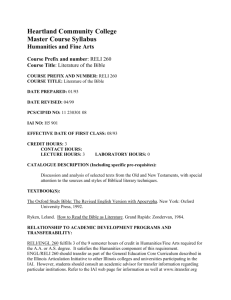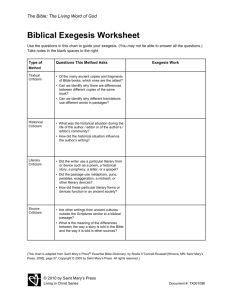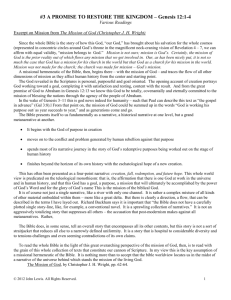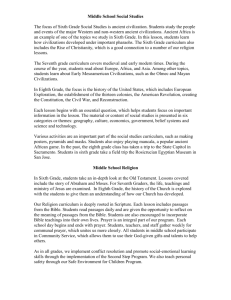reli26001.doc - Heartland Community College
advertisement
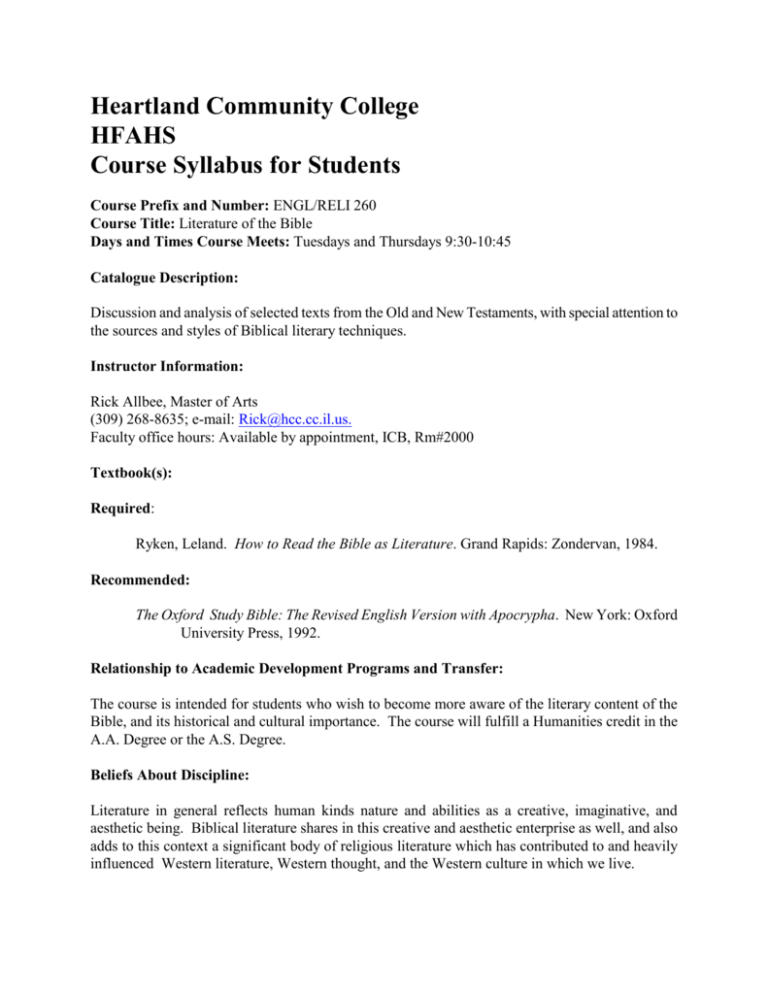
Heartland Community College HFAHS Course Syllabus for Students Course Prefix and Number: ENGL/RELI 260 Course Title: Literature of the Bible Days and Times Course Meets: Tuesdays and Thursdays 9:30-10:45 Catalogue Description: Discussion and analysis of selected texts from the Old and New Testaments, with special attention to the sources and styles of Biblical literary techniques. Instructor Information: Rick Allbee, Master of Arts (309) 268-8635; e-mail: Rick@hcc.cc.il.us. Faculty office hours: Available by appointment, ICB, Rm#2000 Textbook(s): Required: Ryken, Leland. How to Read the Bible as Literature. Grand Rapids: Zondervan, 1984. Recommended: The Oxford Study Bible: The Revised English Version with Apocrypha. New York: Oxford University Press, 1992. Relationship to Academic Development Programs and Transfer: The course is intended for students who wish to become more aware of the literary content of the Bible, and its historical and cultural importance. The course will fulfill a Humanities credit in the A.A. Degree or the A.S. Degree. Beliefs About Discipline: Literature in general reflects human kinds nature and abilities as a creative, imaginative, and aesthetic being. Biblical literature shares in this creative and aesthetic enterprise as well, and also adds to this context a significant body of religious literature which has contributed to and heavily influenced Western literature, Western thought, and the Western culture in which we live. Beliefs About Student Learning: Students who wish to succeed in this course will need to participate attentively and actively in class and seek with intention and effort to understand the class material. It is hoped that thereby you will enlarge and enrich your personal, intellectual, and aesthetic horizons. Beliefs About Instructors Role: My role is to inform and educate you with regard to the literature of the Bible. Further, I will seek to present the material in such a way as to meet you the college student at your present level of understanding, be interesting and relevant, and encourage you to stretch your horizons. Course Objectives (Learning Outcomes): After completing this course you should be able to: 1. Identify the principle literary forms and strategies employed by the writers of the Bible. 2. Identify such literary features as: the main features of prose narrative, the structure of an ancient lyrical poem, the form and constituent elements of an ancient letter and letter essay, typical features of symbolic visionary literature, the elements which comprise a gospel, etc. 3. Gain an understanding of the literary milieu of the Bible and its surrounding cultures (Ancient Near Eastern, Egyptian, Greco/Roman) and how their interaction helped shape Biblical literature. 4. Understand the historical, social, cultural, and geographical background of the Bible, and identify some of the key dates in Hebrew history. 5. Articulate and communicate some of the major ideas that informed individual works of the Bible, as well as specific pericopes. 6. Understand how the ancient Hebrew literature of the Bible contributed to the development of the later literature of the Bible. 7. Recognize and define terms relevant to Biblical literature such as: simile, metaphor, synecdoche, allegory, archetype, type, torah, Pentateuch, Synoptic, parable, pericope, hermeneutics, et al. 8. Be able to identify some of the Bible's influence on English and other literature, and become aware of the relevance, interaction possibilities, and the dynamics for the communication of Biblical literature to other nations and world cultures. 2 Course Outline: I. INTRODUCTION Bible as Literature, Biblical Literature, Hermeneutics, World Views & Religious Literature II. CREATION MYTH AND THE FLOOD-- PRIMEVAL SAGA, Story of Origins (Gen 1-11) III. NARRATIVE LITERATURE-- PATRIARCHAL (Gen 12-50) Abraham and Isaac- Heroic Narrative (Gen 12-26) Joseph in Egypt (Gen 37-50) IV NARRATIVE AND LAW-- TORAH (EXODUS, LEVITICUS, NUMBERS, & DEUTERONOMY-- Selected Passages) The Epic of the Exodus, Moses and the Israelites (Exod) Legal Forms and Codes (Exod, Lev, Numb, Deut-- Selected Passages), and Ancient Treaty (Deut) V. NARRATIVE LITERATURE-- HISTORICAL (Josh, Judges, Ruth, I and II Samuel, I and II Kings, I and II Chrn-- Selected Passages) Judges-- Deborah, Ancient Song Ruth-- Ancient Story United Kingdom-- Saul (Tragic Narrative), David (Heroic Narrative) Divided Kingdom-- Israel and Judah VI. PSALM(S)-- POETIC LITERATURE, ANCIENT LYRIC Cultic Poetry (Selected Psalms) Personal/Expressive Poetry (Selected Psalms) VII. PROPHETIC LITERATURE Introduction to Prophetic Literature and Literary Forms Major Prophets-- Isaiah, and Lamentations (Selected Passages) Minor Prophets-- Amos, Micah, and Nahum VIII. WISDOM LITERATURE Ecclesiastes (Chapters 1-12) Proverbs (Selected Passages) 3 IX. GOSPEL(S)-- ANCIENT BIOGRAPHY Gospel as a Literary Genre-- Ancient Biography Synoptics (Matthew, and Selected Synoptic Parables) X. EPISTOLARY LITERATURE-- ANCIENT LETTERS Epistolary Genre-- Ancient Letters, Occasional letters, General letters, and Pastoral letters (Selected Passages) XI. APOCALYPTIC, VISIONARY LITERATURE-- REVELATION XII. INFLUENCE OF THE BIBLE ON ENGLISH LITERATURE Description of Learning Format: The student should follow this procedure for each class: A. B. C. D. Read the assigned material Attend the lecture Participate in the class discussions and activities Review and study the material Method of Evaluation: Course grades will be determined by total points accumulated during the semester. Points will be assigned as follows: 4 Section Tests 1 Paper (5-7 pages) 2 Selected Readings/With Notes 1 Oral Class Reading/Or 1 Additional Selected Reading/Notes Class Participation = = = 400 points 250 points 200 points = = 100 points 50 points The grading scale used to determine the course grade will be: 90 to 100% 80 to 89% 70 to 79% 60 to 69% Below 60% =A =B =C =D =F 4 Class Participation: Full class participation (attentiveness to the lecture, contributions to the discussions, active involvement in any group work) is encouraged and required. Class questions are welcomed and encouraged. Policies on Attendance: The following requirements should be met: 1. 2. 3. 4. Regular class attendance each week Steady progress in the readings and course work Completion of all assignments and exams as scheduled If you expect to miss class do not call; arrangements will be made upon your return Incompletes: Instructor will follow the college policy on incompletes as outlined in the HCC student handbook. Extra Credit: Extra credit is not generally available, but is reserved for special cases on an individual basis at the instructor's discretion. Missing an Exam and Assignments Policy: Exams are to be taken, and assignments handed in when they are due. The only allowances for making up exams and/or accepting late assignments are pre-arrangements made between the instructor and student, and/or excused absences (serious illness or death in the family). Required Reading and Writing: The student is to complete the readings as assigned in the course calendar (cf. below) prior to class in order to facilitate class room discussion. In addition, the student is to select 2 additional readings in the area of Biblical literature besides the general reading for the class. Notes are to be taken on these readings and handed in. Sources for these readings include: 1) chapters from the introductory essays in the Oxford Study Bible, 2) the journal articles on reserve in the ASC, and 3) readings approved in advanced by the instructor. One 5-7 page double spaced paper is required for the class. It is to be either a literary analysis of a book or extended section of the Bible, or a research paper on the influence of the Bible on English or other world literature. 5 Course Calendar: Assignments: The course assignments are: A) 4 section tests, B) 1 paper (3-5 pages), C) 2 selected readings/with notes and, D) 1 oral class reading/or 1 additional selected reading/with notes. ASSIGNMENT AND COURSE READING CALENDAR Week 1 (Jan 15-17) INTRODUCTION: Bible as Literature Biblical Literature, Hermeneutics, World Views and Religious Literature. Read Ryken, Chapter 1 Week 2 (Jan 22-24) CREATION MYTH, AND THE FLOOD: Genesis Chapters 1-11. Read Genesis Chapters 1-11 Week 3 (Jan 29-31) PATRIARCHAL NARRATIVE: Abraham and Isaac (Genesis 1225:11), Joseph in Egypt (Genesis 37-50). Read Gen 12; 14; 15:1-7; 18:16-33; 21:1-8; 22:1-18; Ryken, Chapter 2 Week 4 (Feb 5-7) PATRIARCHAL NARRATIVE (Continued). Read Gen 37; 39-42; 43-45; 47:1-6 Week 5 (Feb 12-14) NARRATIVE AND LAW: Moses and the Israelites (Exod, Numb), EXAM 1. Legal Forms & Codes (Exod, Lev, Deut-- Select Passages), Ancient Treaty (Deut). Read Exodus Chapters 1:6-2:15; 2:23-3:8; 5:1-5; 10:1-6; 11:1-3; 12:37-41; 13:17-18; 14:5-15:17; Ryken, pp. 75-82; Exodus Chapters 20-23; Leviticus 19:11-18. Week 6 (Feb 19-21) HISTORICAL NARRATIVE AND STORY: Deborah-- Read Judges chapters 4-5; Ruth-- Read Ruth Chapters 1-4 Week 7 (Feb 26- 28) HISTORICAL NARRATIVE: Samuel; United Kingdom, Saul and David (Selected Passages); Divided Kingdom, Israel and Judah (Selected Passages) I Sam 8:1-7; 13:5-14; 15:1-23; 18:5-16; 28:1-20; 31.Read Ryken, pp. 83-86; I Sam 17; 18:1-7; II Sam 7. EXAM 2 Week 8 (Mar 6-8) PSALMS POETIC LITERATURE: Cultic, and Personal Poetry. Read Ryken, Chapters 4-5; Select Psalms Week 9 (Mar 12-14) SPRING BREAK 6 Week 10 (Mar 19-21) PROPHETIC LITERATURE: Major Prophets--Isaiah, Lamentations (Selected Passages). Read Ryken, Chapter 10-11 Week11 (Mar 26-28) PROPHETIC LITERATURE: Minor Prophets--Amos, Micah, Nahum. Read Amos, Micah, and Nahum Week 12 (Apr 2-4) WISDOM LITERATURE: Ecclesiastes (Chapters 1-12), Proverbs (Selected Passages). Read Eccles Chapters 1-12; Proverbs Chapters 1-9; select other Proverbs. Read Ryken, Chapter 6. EXAM 3 Week 13 (Apr 9-11) GOSPEL(S)--ANCIENT BIOGRAPHY: Matthew, Selected Synoptic Parables. Read Ryken, Chapters 7-8; Matt 2:1-6; 4:1-20; 5-8; 12:1-16; 21:23-45; 22:15-46; and selected metaphorical passages in John. READING NOTES DUE Week 14 (Apr 16-18) PARABLES- SELECTED PARABLES. Read Ryken, Appendix 1. Week 15 (Apr 23-25) EPISTOLARY LITERATURE-- ANCIENT LETTERS: Occasional, General, Pastoral (Selected Passages). Read Ryken, Chapter 9; Rom 1-4; Phil 1-2; Week 16 (Apr 30-M 2) APOCALYPTIC--VISIONARY LITERATURE: Revelation. Read Ryken, Chapter 11; Revelation 4:1-8; 6; 12-13; 16:19-21; 18:1-10; 21:9-22:5 Week 17 (May 7-9) Week 18 (May 14-16) FINAL EXAM WEEK: EXAM 4; PAPER DUE INFLUENCE OF THE BIBLE ON ENGLISH LITERATURE. 7
